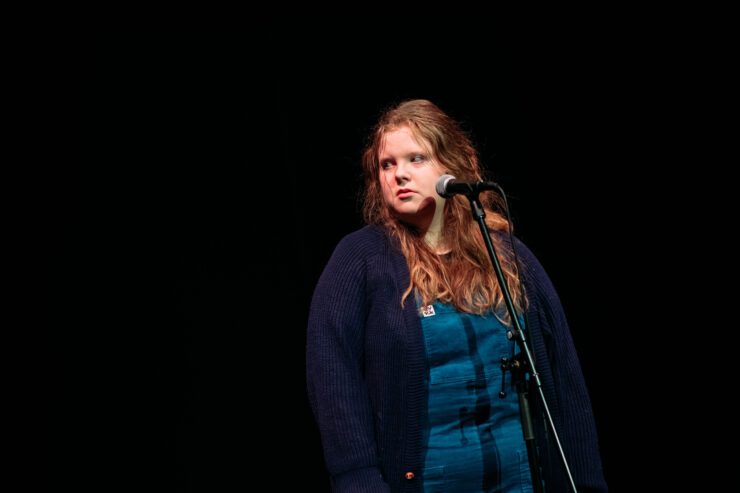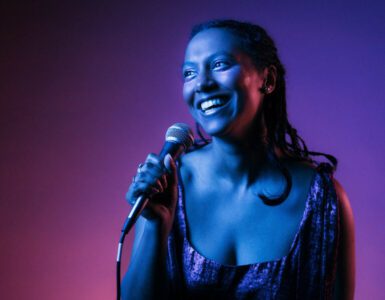We last caught up with Elisabeth Flett at a shorter version of her show, The Selkie’s Wife, at Dundee Fringe last year, which we described as “a bewitching performance shown by transforming the Scottish folktale into one of female autonomy and queer yearning.” As the show now heads to the Edinburgh Fringe stage, we thought it high time to catch up with her again to talk more about her decidedly sapphic retelling of the Selkie tale.
Catch The Selkie’s Wife at theSpace @ Surgeons Hall – Theatre 3 between August 2nd and 10th at 14:05. Tickets are available through the EdFringe Box Office.
Jake: Hi Elisabeth, tell us about your show’s journey from creation to ending up at the EdFringe stage.
Elisabeth: The Selkie’s Wife started off as a short story, written in March 2023. Originally a piece of micro fiction based around the Scottish folk tale The Selkie Wife (the apostrophe in my show name is doing some heavy lifting) I found myself going back to the story throughout the year. To start off with it was a queer perspective of the classic story – a female seal-human is captured by a lonely fisherman, who hides her selkie skin so she cannot go back to the sea – told by that seal woman’s selkie wife, alone under the waves. It ended as you might expect; the selkie wife mourning from the water as she watches her love trapped on land in her human form.
The more I thought about it, however, the more questions came to mind. Why did this selkie wife not come ashore to rescue her beloved from the fisherman?
What kind of selkie was she? What kind of person? Wouldn’t she be…angry? By the end of 2023 I had a complete short story; by April 2024 I realised that the story might be a show, and wrote a 10 minute scratch version at Capital Theatre’s Open Floor night; by January 2024 I’d managed to create The Selkie’s Wife in its entirety.
It’s been a challenging but fun experience writing this show, and I’m so excited to bring the performance to the Fringe!
Jake: It certainly sounds like the show has been on a journey – but what was the inspiration that sparked off your connection with the piece in the first place?
Elisabeth: There were a few different inspirations behind this show. The main one is that, as a queer folklorist who studied on the Ethnology & Folklore Masters course at the University of Aberdeen in 2020-2021 and came across little LGBTQ+ or female representation in my reading lists, I’m passionate in sharing and creating representation within the field of Scottish folkloristics
I created The Selkie’s Wife – a show full of sapphic storytelling, sneaked-in academic facts and live folk music – to try and do exactly that. Another inspiration is my own personal experiences with chronic pain. This is my first time writing about my pain, and it was both nerve-wracking and liberating to be so honest about how difficult it is to, to quote the show, live ‘tied down to a body which has forgotten how to serve you’. It feels very powerful to talk about this aspect of my identity in The Selkie’s Wife, and I hope that it means as much to audience members who have similar lived experience as it does to me as the creator of the piece.
I think that the show will connect with anyone who is interested in queer identity and queer history, anyone who enjoys live folk music and weird folky soundscapes, anyone who likes storytelling and/or anyone who is interested in themes around disability and disability activism.
Jake: So what are you hoping the audience will take away from it all?
Elisabeth: I’m hoping that audience members will walk away from The Selkie’s Wife with a new perspective on Scottish folklore, and a newfound interest in how to make that folklore more representative of who actually lives in this country in 2024. It’s time to disrupt the cishet white male chokehold. Where are the folk tales about LGBTQ+ lovers? The folk tales about disabled heroes? If someone goes off after seeing The Selkie’s Wife thinking, “I could write my own queer folk tale!” then my work really is done.
Jake: Now that we’re gearing up for Fringe season, what are you most excited for?
Elisabeth: The queer folklore revolution is definitely here at the moment (I should get that on a t-shirt!) in the fields of both storytelling and folklore overall, and I’m so thrilled that revolution is represented at this year’s Fringe by more shows than just myself. I’d love to give a shout out to a few more shows re-imagining folk through an LGBTQ+ lens:
Queer Folks’ Tales (real-life stories told by some of Scotland’s best storytellers)Scottish Storytelling Centre, Aug 8th, 15th, 22nd.
Joyfully Grim: Re-imagining A Queer Adolescence (a queer coming of age told story through poetry and folklore)Scottish Storytelling Centre, Aug 2, 4, 6, 8, 10, 12, 16, 18, 20, 22, 24.
Land Under Wave (a fresh, fun re-imagining of Scottish folk song and fairy tale) Scottish Storytelling Centre, Aug 20-21, 23-25.
Jake: Fitting with the themes of our magazine, if your show was an alcoholic beverage (think cocktails, shots, beers, be creative!) what would it be?
Elisabeth: The Selkie’s Wife would be a Bloody Mary: a little sweet, a little spicy and the colour of revenge…
Hear the latest from Marginalised Voices from Fringes across the World
Subscribe to our Email Newsletter so we can send you insightful updates about unheard creative voices working to platform powerful stories. You'll be the first to hear about our content and how to apply to have shows you're working on reviewed.
Powered by EmailOctopus









